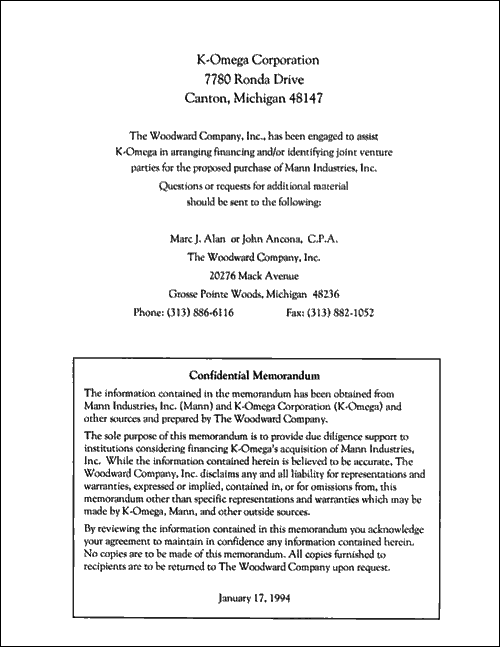|
|
White Papers
I wrote white papers for clients of The Woodward Company.
|
 |
When I was analyzing companies for The Woodward Company, I used the same techniques as when I was writing brochures: find out the facts about the company.
I investigated many technical areas and presented factual information so that the investment community could make informed decisions.
Here is my summary of the advantages of one company, from page 3 of the pdf (I wrote the entire document):
Mann's proprietary advantages.
Mann's homopolymer fibers are stronger and finer than the competition's co-polymer fibers, and cheaper.
Mann's fiber producing process is inorganic and water-based. DuPont has already exited the acrylic fiber business, and Bayer has exited many markets, because their organic, solvent-based processes are non-competitive both economically and environmentally with Mann's water-based process.
Major research & development breakthroughs in the last year and a half have enabled Mann to exploit its proprietary fiber and yarn products in lucrative technical niche markets.
John Kim and K·Omega see Mann as a unique acquisition opportunity: a very profitable, market leading, niche-oriented manufacturer of proprietary products.
Mann's Proprietary Fiber: A-451 Yarn
Mann Industries is the only integrated supplier in the world of single and two-ply pigmented acrylic yarns to customers who manufacture top-end lightfast products such as awnings, automobile tops, marine fabrics, and outdoor furniture.
Mann has 60% of the domestic acrylic outdoor furniture market and 10% of the acrylic marine fabric market. The awning segment is growing at a compound rate of about 20% a year; manufacturers who make fabric from Mann yarns are about to offer awnings with a five-year defect-free guarantee.
Acrylic yarns are preferred for use outdoors because they are more stable under outdoor exposure to sunlight and weather elements than nylon, polyester or cotton. Pigmented acrylic yarns have become the fabric of choice. Monsanto is the only other domestic producer of pigmented acrylic fiber. In the past three year, Mann has capitalized on its integrated fiber and yarn producing capacity to supply yarns to the outdoor trade, including exports. Monsanto has an exclusive agreement with Glen Raven Mills, leaving the rest of the market to Mann.
A-451 is particularly colorfast, dimensionally stable, bleach resistant, and resistant to degradation from sunlight. A French testing lab, TexTest, has determined that fiber A-451 is superior to any other product in strength, color retention, resistance to ultraviolet.
Revenues for A·451 were approximately 21 % of sales for 1992. Management esdm.atcs rna they can achieve 15 to 25% of an approximately $160 million market for these outdoor yarn ....
Mann's Proprietary Fibers & Yarns: Biokryl
Biokryl has the unique ability to resist the proliferation of bacterial and fungal growth. It inhibits odor and mildew, and is nontoxic, odorless, and permanent. It can be used in clothing, health care products, sporting goods, and home furnishings.
Biokryl is distinctly different from its nearest competing products, which have a topical solution applied to commodity fibers after they are manufactured. This causes the effectiveness of the product to degrade with use, usually after one washing.
Biokryl, however, through a unique extrusion process known only by the Company, has its antimicrobial agent intimately incorporated into the fiber. The antimicrobial effect therefore lasts the life of the end product.
Biokryl is more effective than competing topically applied antimicrobial agents, hypoallergenic, non-toxic, and non-allergenic.
Biokryl's life-time efficacy, non-hazardous nature and relatively low cost have caused competitors to disband their efforts to produce a competing product. Instead, former competitors such as DuPont have opted to buy Blokryl for distribution to their customers.
Mann's Proprietary Fibers & Yarns: Industrial friction products JM,190, A521/513
Industrial friction fibers are sold to customers for use in brake pad manufacturing for the automotive, truck, and train industries.
Mann developed and commercialized a refined, pulped homopolymer fiber that replaces Kevlar and asbestos in brakes, virtually displacing the only competitor, American Cyanamid's copolymer product. This fiber also has applications in cement, stucco and paint. While JM.190 provides "green strength" to brake pads before they are cured, it contributes little to the final brake performance.
Mann and Textron have jointly developed a second-generation product that could dominate this market. It combines carbon fibers with JM~190 so that the product gives green strength as well as final strength, at a much lower cost than DuPont's Kevlar product.
Mann's Proprietary Fibers & Yarns: Industrial Specialties
Homopolymer acrylic, unlike copolymer acrylic fiber and most other generic fibers, is very resistant to chemical attack, including hydrolysis by water or steam, reaction with acids, and other chemical reactions.
Mann's acrylic fiber is the only domestic acrylic fiber that can be used in such specialty applications as hot gas filtration (power plants), paper making felts, and other demanding applications.
Bayer dominated the US and world markers for many years, but is exiting the market because of an inability to be price competitive. The only other producers of significance are Hoechst AG in Germany and Montefibre in Italy. |
 |

|